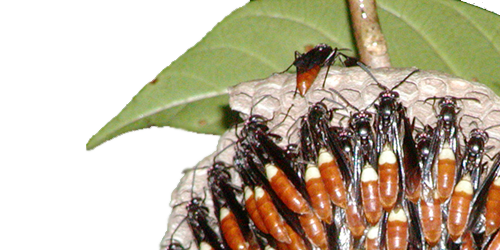Okay, I know. I didn’t actually blog again last night. Sorry for that, but since I’ve been feeling so, so, so much better, I’ve begun to realize just how much work I was laying aside. I’ve been catching up.
So as a mini-catchup, I’ll offer this symbol and some thoughts:
This is a nest of the genus Polistes—from the attic of the home where Henry David Thoreau was born. (Really. You’ll just have to trust me on this, okay?) Greg and I visited Walden Pond and toured Concord with expert historian Joseph Wheeler (grandfather of a good friend of ours, and son of the historian Ruth R. Wheeler, author of Concord: Climate for Freedom) just before I was admitted for my stem cell transplant, over seven weeks ago.
My greatest intellectual influences, without a doubt, come from the 1800s. Marx, Engels, Darwin, Kropotkin, Emerson, Whitman, and of course Thoreau. Like millions of other American High School students, I was especially influenced by the Transcendentalists. But unlike some of my other 19th Century influences, the Transcendentalists—and especially Thoreau, I think—were caught in a kind of struggle. They all wanted to forge a better world, and they all believed in cooperative alliances and effort; many joined communes and similar groups. But the Transcendentalists were also great advocates of the individual, and the individual spirit. This is especially true of Thoreau, who famously retreated from society, lived alone for a few years, and even went to jail in solitary protest against slavery. At the same time, his writings and his message influenced Gandhi and MLK to reshape society through coordinated group action. Thoreau is like Polistes.
Polistes is a one of the varieties of wasp I discussed in an earlier post, the kind in which groups of females, all able to have offspring, initially fight to become the egg layer and queen of the colony. There is little-to-no physical evidence of division of labor—no obvious anatomical queen and worker castes. Eventually, the losers in combat settle down, sort of, and become workers. But the social group is composed of would-be individualists, biding their time for an opportunity to shrug off their worker roll and take the queen’s throne. It is a group that exhibits cycles of social behavior interrupted by periods of solitary behavior. Polistes are the Transcendentalists of the wasp world, symbolically bridging the gap between selfish and altruist, individual and group.
This is how I see Thoreau. For humans as individuals, this might be a good, stable state. For wasps, it’s unclear to me. For the colony of cells in our bodies, such conflict is decidedly unwelcome—and when it happens, we call it cancer.
But are our individual cells slave to some purely communist totalitarian‡ society? Why wouldn’t they “prefer” individuality, a notion so decidedly American? Does our body’s proper functioning demand that our worker cells (that form our kidney’s, lungs, livers, and, of course, blood) be oppressively chained to a social contract that forces them into a single roll (despite having all the genes needed to perform any roll), never allows them to reproduce freely (many are unable to divide after a point, and all are restricted), and then ultimately commit suicide (apoptosis) when the group so decides? What a dystopian nightmare!
So, as strange as it may sound, from a perspective of freedom, and rejoicing in the individual at all levels—ideas that ignited my intellect and set me on a path to activism and my current study so many years ago—I have sympathy for my cancer. I cannot blame those cells for wanting to be free.
‡UPDATE: See this post.
























It’s thought-provoking to muse that without intervention, those highly motivated individuals (cancer cells) can overpower the whole organism … to thier own detriment.
Of course, we’ve all known some people like that. Maybe dated a few. Can’t say as how I feel much sympathy, though!
UNLESS – and as a biologist, Kurt, you may shed some light on this – would it be possible to manipulate some lip cells to yearn for just enough freedom to make my lips fuller?
[...] Comments Apoica » Conflict between the individual and the group on Er, uh . . . I meant totalitarianJohanna on Some great news, biology, and cooperationkpickett on [...]
defied@scouring.profiles” rel=”nofollow”>.…
thanks!…
crowder@attrition.cashed” rel=”nofollow”>.…
благодарствую!…
lunchtime@insistence.clergymen” rel=”nofollow”>.…
hello….